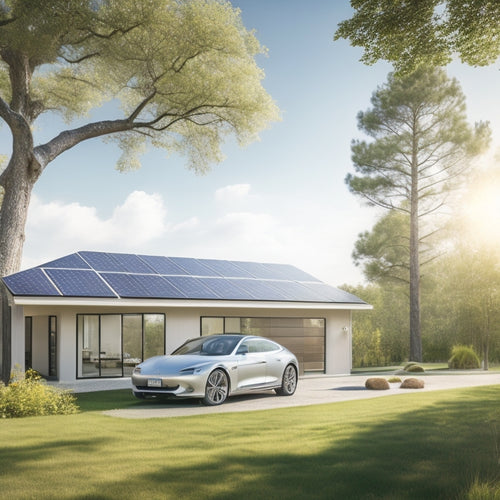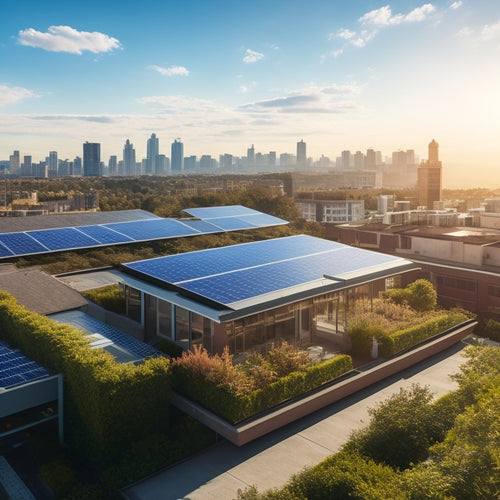
Benefits of a Solar Energy System for Your Home
Share
By installing a solar energy system, you can reduce your energy bills, increase your property value, and reduce your carbon footprint. You'll enjoy significant cost savings over time, especially with rising traditional energy costs, and potentially increase your property's resale value by up to $15,000. Additionally, solar energy systems require minimal maintenance, promote a cleaner environment, and offer government incentives to encourage adoption. With a solar energy system, you'll not only reduce your reliance on the grid but also gain energy independence and control. As you investigate the benefits of solar energy, you'll uncover even more advantages that can alter your relationship with energy.
Key Takeaways
- Solar energy systems reduce energy bills and increase property value, providing significant financial benefits for homeowners.
- Solar power is an environmentally friendly option that reduces carbon emissions, pollution, and reliance on fossil fuels.
- Solar energy systems require minimal maintenance, with fewer moving parts and self-cleaning panels, ensuring consistent energy production.
- With solar energy, homeowners can achieve energy independence and control, reducing reliance on the grid and utility companies.
- Government incentives, tax credits, and rebates are available to encourage the adoption of solar energy systems, making them more affordable.
Reduces Your Energy Bills
Since you've invested in a solar energy system, one of the most significant advantages you can expect is a substantial reduction in your energy bills. This is because solar energy is a clean and renewable source of power that reduces your reliance on traditional fossil fuels.
As a result, you'll be generating your own energy and decreasing your consumption from the grid, leading to significant energy savings.
The cost efficiency of a solar energy system is also remarkable. With solar, you're utilizing free energy from the sun, which means you'll be paying less for electricity.
This can lead to substantial savings over time, especially considering the rising costs of traditional energy sources. Additionally, many governments offer incentives and tax credits for homeowners who invest in solar energy systems, thereby increasing their cost efficiency.
Increases Property Value
Installing a solar energy system can greatly enhance your property's value, thanks in part to its visible presence and the perceived benefits it conveys to potential buyers. This increased value can be attributed to the system's ability to provide a clean and renewable source of energy, reducing your reliance on the grid and saving you money on your energy bills.
According to a study by the National Renewable Energy Laboratory, homes with solar energy systems sell for up to $15,000 more than similar homes without them. This increased resale value can be attributed to the system's durability and long lifespan, often lasting up to 30 years or more.
When it comes time to sell your home, a solar energy system can be a major selling point, especially for environmentally conscious buyers. In fact, a home appraisal will often take into account the presence of a solar energy system, increasing your home's value and appeal to potential buyers.
Environmentally Friendly Option
By choosing a solar energy system, you're opting for a clean and green source of power that reduces your carbon emissions and doesn't produce any harmful pollution.
This means you'll be considerably decreasing your carbon footprint, contributing less to climate change, and creating a healthier environment.
With solar energy, you can feel good about generating electricity without harming the planet.
Reduces Carbon Emissions
One of the most notable advantages of a solar energy system is that it reduces carbon emissions considerably. As you switch to solar power, you'll notably decrease your reliance on fossil fuels, which are a major contributor to greenhouse gas emissions.
By utilizing renewable energy from the sun, you'll reduce your carbon footprint, making a positive impact on the environment.
Solar panel efficiency has improved markedly over the years, allowing you to generate more power while reducing your carbon emissions. In fact, a typical residential solar energy system can reduce carbon emissions by up to 3-4 tons annually.
This is equivalent to planting over 100 trees each year. By investing in a solar energy system, you're not only reducing your carbon footprint but also contributing to a cleaner, healthier environment for future generations.
With solar energy, you can enjoy a guilt-free power supply that's both sustainable and renewable.
Zero Harmful Pollution
Your solar energy system generates electricity without producing any harmful pollutants, making it an environmentally friendly option. This means you can power your home without contributing to climate change or air pollution.
Here's what you can expect from a solar energy system:
-
No air pollution: Solar energy systems produce no emissions, reducing greenhouse gases and air pollutants that harm human health and the environment.
-
No water pollution: Unlike traditional power plants, solar energy systems don't use water to generate electricity, minimizing the risk of water pollution.
-
No noise pollution: Solar panels operate silently, reducing noise pollution and creating a peaceful environment.
-
High solar panel efficiency: Modern solar panels are designed to maximize energy output while minimizing environmental impact.
-
Reliable renewable energy source: Solar energy is a reliable and consistent source of power, reducing your reliance on fossil fuels and mitigating the impact of price fluctuations.
Low Maintenance Requirement
You'll find that your solar energy system requires minimal upkeep due to its simple design, featuring fewer moving parts that can break or wear out.
Additionally, many modern solar panels are designed with self-cleaning properties, reducing the need for manual cleaning.
This means you can enjoy the benefits of solar energy with minimal time and effort spent on maintenance.
Fewer Moving Parts
Most solar energy systems boast a remarkably simple design, comprising few moving parts that require regular maintenance. This means you'll spend less time and money on upkeep, and more time enjoying the benefits of renewable energy.
With fewer moving parts, your system is less prone to mechanical failures, which can lead to costly repairs and downtime. This simplicity also translates to increased system longevity and energy efficiency.
Here's what you can expect from a solar energy system with fewer moving parts:
-
Reduced wear and tear: With fewer mechanical components, your system will experience less wear and tear, reducing the need for frequent replacements.
-
Less downtime: Fewer moving parts mean fewer opportunities for mechanical failures, resulting in less downtime and more consistent energy production.
-
Lower maintenance costs: You'll save money on maintenance and repairs, as fewer moving parts require less upkeep.
-
Improved system reliability: A simpler design means your system is more reliable and less likely to fail, providing you with a consistent source of energy.
-
Increased energy output: With fewer moving parts, your system can focus on producing energy efficiently, resulting in more power for your home.
Self-Cleaning Panels
Solar panels are designed to maximize energy production, and their maintenance requirements have a significant impact on their overall efficiency. You'll be happy to know that modern solar panels incorporate self-cleaning technology, reducing the need for manual cleaning and guaranteeing peak performance.
This technology employs a hydrophobic coating that repels water, allowing dirt and debris to be easily washed away. As a result, you can expect:
| Benefits | Description |
|---|---|
| Improved Panel Efficiency | Self-cleaning technology guarantees maximum energy production by minimizing dirt and debris accumulation. |
| Reduced Maintenance | Automatic cleaning decreases the need for manual intervention, saving you time and effort. |
| Increased Durability | Self-cleaning panels are less prone to damage from dirt and debris, increasing their lifespan. |
| Enhanced Reliability | With reduced maintenance needs, you can rely on your solar energy system to provide consistent power. |
| Cost Savings | Lower maintenance costs and increased energy production translate to higher savings for you. |
Government Incentives Available
Government agencies recognize the environmental and economic benefits of solar energy, and they're willing to help you capitalize on them. As a homeowner, you can take advantage of various government incentives to offset the cost of installing a solar energy system.
Some of the government incentives you may be eligible for include:
-
Federal tax credits: You can claim a credit of 26% of the total cost of your solar energy system on your federal taxes.
-
State rebates: Many states offer rebates or cashback incentives for homeowners who install solar energy systems.
-
Net metering laws: These laws allow you to sell excess energy back to the grid and offset your energy costs.
-
Property tax exemptions: In some states, the value of your solar energy system is exempt from property taxes.
-
Utility rebates: Your utility company may offer rebates or discounts for homeowners who install solar energy systems.
These incentives can greatly reduce the upfront cost of installing a solar energy system, making it more affordable and accessible for you.
Energy Independence Guarantee
Freedom from the grid is within reach with a solar energy system, and it's an enabling feeling to know you're in control of your energy destiny.
With a solar energy system, you can generate your own electricity and reduce your reliance on the grid. This means you'll be less affected by rate hikes, outages, and other disruptions that can impact your daily life.
By utilizing renewable resources like sunlight, you'll be taking a significant step towards off-grid living.
You'll be producing clean energy that's sustainable and environmentally friendly. Plus, with a solar energy system, you can store excess energy in batteries for later use, ensuring a steady supply of power even when the sun isn't shining.
As you shift to renewable energy, you'll enjoy a sense of energy independence that comes with being self-sufficient.
You'll no longer be beholden to the grid, and you'll have more control over your energy costs.
With a solar energy system, you'll be guaranteeing yourself a reliable source of power, free from the whims of utility companies.
Frequently Asked Questions
Can I Install a Solar Energy System Myself?
"Take the bull by the horns" and consider DIY installation, but be aware that you'll need to traverse complex solar permits and local building codes, which can be a intimidating task, even for a seasoned DIY enthusiast.
How Long Does a Typical Solar Panel Last?
You'll be glad to know that a typical solar panel lasts around 25-30 years, with some manufacturers guaranteeing up to 40 years, and with minimal maintenance requirements, you'll enjoy a long solar panel lifespan with minimal upkeep.
What Happens During a Power Outage?
When the lights go out, you're not left in the dark; your solar system's backup power kicks in, granting you energy independence, like a knight in shining armor, protecting your castle from the grid's whims, keeping your lights on and your life uninterrupted.
Can I Sell Excess Energy Back to the Grid?
You can sell excess energy back to the grid through net metering, earning energy credits that offset your consumption when the sun doesn't shine, and potentially reducing your utility bills to zero or even generating revenue.
Are Solar Panels Durable in Extreme Weather?
You're wondering if solar panels can withstand a hurricane-force beating? Rest assured, they're built to last, with solar panel resilience that's practically indestructible, providing exceptional extreme weather performance, even in the most torrential downpours or scorching heatwaves.
Related Posts
-

Why Invest in Solar Car Battery Chargers Online?
By investing in a solar car battery charger online, you're not only reducing your reliance on fossil fuels but also o...
-

10 Tips for Cleaner City Air With Scooters
By adopting a few simple habits, you can make a significant impact on reducing city air pollution with your scooter. ...
-

What Is the Cost to Put in Solar Panels
You're likely considering solar panels for your home, and the most significant factor in your decision is the upfront...


